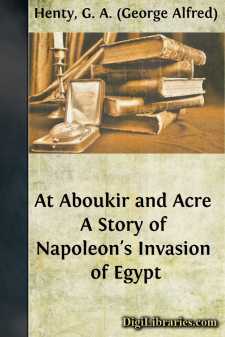Categories
- Antiques & Collectibles 13
- Architecture 36
- Art 48
- Bibles 22
- Biography & Autobiography 813
- Body, Mind & Spirit 142
- Business & Economics 28
- Children's Books 17
- Children's Fiction 14
- Computers 4
- Cooking 94
- Crafts & Hobbies 4
- Drama 346
- Education 46
- Family & Relationships 57
- Fiction 11829
- Games 19
- Gardening 17
- Health & Fitness 34
- History 1377
- House & Home 1
- Humor 147
- Juvenile Fiction 1873
- Juvenile Nonfiction 202
- Language Arts & Disciplines 88
- Law 16
- Literary Collections 686
- Literary Criticism 179
- Mathematics 13
- Medical 41
- Music 40
- Nature 179
- Non-Classifiable 1768
- Performing Arts 7
- Periodicals 1453
- Philosophy 64
- Photography 2
- Poetry 896
- Political Science 203
- Psychology 42
- Reference 154
- Religion 513
- Science 126
- Self-Help 84
- Social Science 81
- Sports & Recreation 34
- Study Aids 3
- Technology & Engineering 59
- Transportation 23
- Travel 463
- True Crime 29
At Aboukir and Acre A Story of Napoleon's Invasion of Egypt
Categories:
Description:
Excerpt
MAKING A FRIEND.
Two lads were standing in one of the bastions of a fort looking over the sea. There were neither guards nor sentinels there. The guns stood on their carriages, looking clean and ready for action, but this was not the result of care and attention, but simply because in so dry a climate iron rusts but little. A close examination would have shown that the wooden carriages on which they stood were so cracked and warped by heat that they would have fallen to pieces at the first discharge of the guns they upheld. Piles of cannon-balls stood between the guns, half-covered with the drifting sand, which formed slopes half-way up the walls of the range of barracks behind, and filled up the rooms on the lower floor. Behind rose the city of Alexandria, with its minarets and mosques, its palaces and its low mud-built huts. Seaward lay a fleet of noble ships with their long lines of port-holes, their lofty masts, and network of rigging.
"What do you think of it, Sidi?"
"It is wonderful!" his companion replied. "How huge they are, what lines of cannon, what great masts, as tall and as straight as palm-trees! Truly you Franks know many things of which we in the desert are ignorant. Think you that they could batter these forts to pieces?"
The other laughed as he looked round. "One of them could do that now, Sidi, seeing that there is scarce a gun on the rampart that could be fired in return; but were all in good order, and with British artillerists, the whole fleet would stand but a poor chance against them, for while their shot would do but little injury to these solid walls, these cannon would drill the ships through and through, and if they did not sheer off, would sink them."
"But why British artillerists, brother, why not our own people?"
"Because you have no properly trained gunners. You know how strong Algiers was, and yet it was attacked with success, twice by the French, twice by ourselves, and once by us and the Dutch; but it is a rule that a strongly defended fort cannot be attacked successfully by ships. If these forts were in proper condition and well manned, I don't think that even Nelson would attack them, though he might land somewhere along the coast, attack and capture the town from the land side, and then carry the batteries. Successful as he has been at sea, he has had some experience as to the difficulty of taking forts. He was beaten off at Teneriffe, and although he did succeed in getting the Danes to surrender at Copenhagen, it's well known now that his ships really got the worst of the fight, and that if the Danes had held on, he must have drawn off with the loss of many of his vessels."
"I know nothing of these things, brother, nor where the towns you name are, nor who are the Danes; but it seems to me that those great ships with all their guns would be terrible assailants. As you say, these forts are not fit for fighting; but this is because no foes have ever come against us by sea for so many years. What could an enemy do if they landed?"
"The Mamelukes are grand horsemen, Sidi, but horsemen alone cannot win a battle; there are the artillery and infantry to be counted with, and it is with these that battles are won in our days, though I say not that cavalry do not bear their share, but alone they are nothing....












